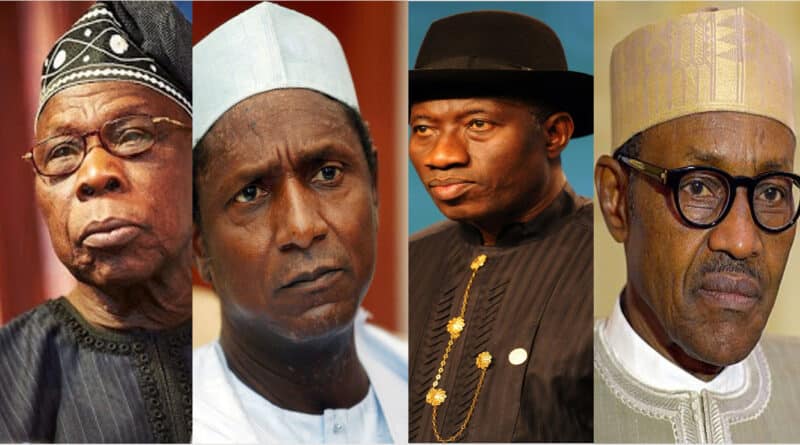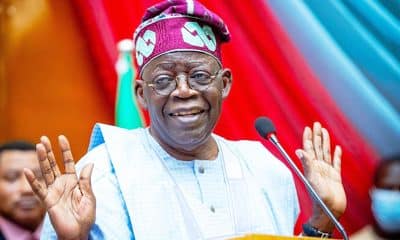Gist
Check Out Inflation Rates During Administrations Of Obasanjo, Yar’Adua, Jonathan, Others

Inflation rates have been one of the major problems that have bedevilled the Nigerian economy for years.
Naija News reports that Nigeria’s inflationary pressure is tied to food insecurity, depreciation of the exchange rate, and oil price volatility, amongst others.
The level of inflation in the country is often used as a metric to assess the performance of an administration, seeing as inflation affects every member of society.
However, despite changes in leaders, policies, and fiscal direction, the high inflation has remained unabated.
In this article, Naija News looks into the inflation rates of various administrations since 1999.
Olusegun Obasanjo (1999 – 2007) – 12.3%
During Obasanjo’s tenure, Nigeria recorded an average inflation rate of 12.3%, with an entry rate of 8.28% and a closing rate of 4.64% in May 2007.
The administration recorded its highest inflation rate in August 2005, after the consumer price index surged by 28.21%, before moderating back to single digits.
During his tenure as president, Obasanjo introduced N100, N200, N500, and N1000 denominations of the local currency into the economy, which is argued to have fuelled inflationary pressure.
Meanwhile, the Obasanjo administration was bedevilled by high foreign debts, increased poverty levels, and ethnic crises. The cumulative inflation rate over the period stood at 143.5% as the CPI surged from 31 to 75.4 index points.
In the same vein, his administration coincided with the global Great Recession, which affected the global financial market leading to several job losses and economic downturns.
Musa Yar’Adua (2007 – 2010) – 11%
An average inflation rate of 11% was recorded during Yar’Adua’s administration. The late politician took over the presidency in May 2007 following a 4.64% inflation but saw inflationary pressure gallop to 15.04% before he died.
However, Yar’Adua’s administration was marred with high insecurity in the Niger Delta and insurgency in the northern region of the country.
His administration recorded the highest inflation in February 2010 at 15.65%.
Goodluck Jonathan (2010 – 2015) – 10.22%
Jonathan, who was the vice of his Yaradua, inherited a high inflation rate. However, during his tenure, an average inflation rate of 10.22% was recorded
His entry rate was 15.04% but saw it decline to 9% at the end of his tenure while operating under similar macro and socio-economic conditions as his predecessor.
During the period, Nigeria also endured massive killings in the north by the Boko Haram insurgent group, although with a decline in the activities of the militants in the Niger Delta region, thanks to the Amnesty Programme established by the previous administration.
Muhammadu Buhari (2015 – 2023) – 22.41%
Between June 2015 and December 2022, Nigeria experienced an average inflation rate of 14.52%, recording a 17-year high of 21.34% in November 2022,
Buhari’s administration was characterised by high food prices, plummeting oil prices as an eventual surge in oil prices, high currency in circulation, and huge arbitrage in the FX market amongst others.
The crude oil crisis in 2016 coupled with the transition from the fixed FX regime to a flexible regime by the CBN also had a significant impact on Nigeria’s inflation.
Buhari, upon assumption of office as the president in May 2015, started with an inflation rate of 9 per cent, but handed over power on May 29, 2023, with the rate of a 13.22 per cent increase.
Bola Ahmed Tinubu (2023-Present) – 29.90%
President Tinubu inherited a high inflation rate from his predecessor.
However, the inflation rate has continued to increase since he took over power, a resultant effect of his economic policies and the removal of the fuel subsidy which he announced on the day of his inauguration.
A report from the National Bureau of Statistics (NBS) has shown that the country’s inflation surged further in January 2024, hitting 29.90 per cent from the 28.92 per cent recorded in December 2023.
The statistics bureau detailed that the January increase was 0.98% higher than the 28.92 rate point recorded in December 2023.












